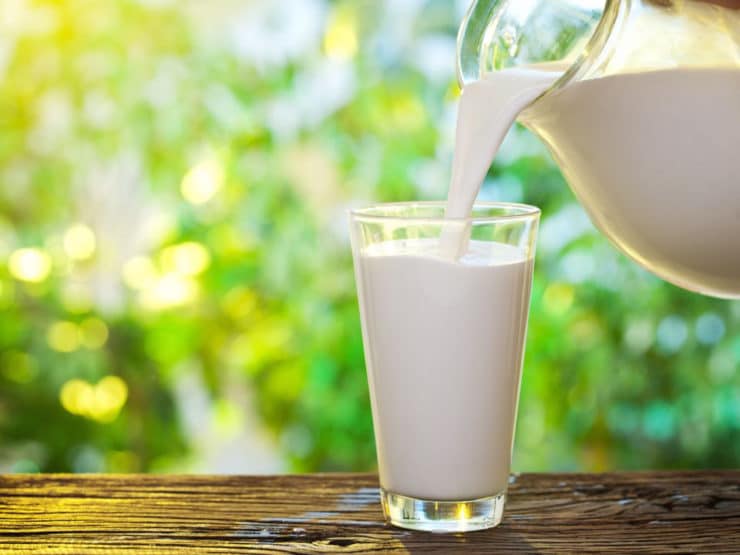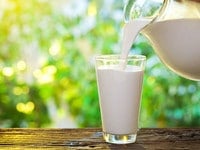
I’ve been buying organic milk and dairy products for the past several years due to concerns about growth hormones and antibiotics found in standard milk and dairy. I grew up drinking 1% and 2% milk, so I continued buying it as an adult assuming it was the best nutritional choice for my family. After reading recent studies, my perspective shifted. New research suggests that consuming whole fat dairy is linked to reduced body fat. While scientists aren’t exactly sure what causes this seemingly counter-intuitive correlation, there are a few theories. Some believe that full fat dairy leads to a greater feeling of satiety, causing people to eat less and feel full. Others point to bioactive substances in the milk that might alter our metabolism. I’ve also learned that organic whole milk contains more helpful fatty acids than conventional whole milk. It has a better balance of fatty acids and is higher in healthy omega-3. This is largely due to the fact that organic farmers must allow their dairy cows to graze in the pasture for a certain amount of hours per week. More and more, the evidence seems to point towards organic whole milk as the best choice for many dairy consumers. People with high cholesterol and other health issues associated with saturated fat intake may want to think twice about making the switch. But for the rest of us, whole milk may be a better choice for maintaining a healthy weight.
I don’t know why I was surprised to learn all of this. After all, whole milk is more natural and closer to what our grandparents and great grandparents were drinking. Of course many argue that raw, unpasteurized milk is the ideal “old fashioned” and nutritionally better way, but I refuse to jump on that bandwagon due to my concerns about food borne illness. That said, overall I’m convinced that we need to take a step back from processed items. The more we gravitate towards simple, natural, organic ingredients, the better off we’ll be. I will continue to enjoy organic whole milk with my family. Not only is it nutritionally superior, it is a heck of a lot tastier than lowfat and nonfat milk.
What do you think? Have you considered switching to whole milk? Are you already drinking it? What do you think about organic dairy vs. non organic? Or have you eliminated milk from your diet completely? I’d love to hear from you.



I drink almond milk!!!!!
I’ve switched off of lowfat and nonfat products and I’m encouraging others to do the same. Reading labels. Haven’t made the switch to organic, altho I’d like to.
Yes I tend to keep to whole food where possible including Milk.
The high butter fat content of organic Finnish ice cream is the only kind of ice cream I can eat without getting gastric disturbances. It also doesn’t hurt my sensitive teeth like the typical American versions.
I got dairy intolerance After i had switch to a vegan diet for 4 years. My stomach wasn’t ready for consuming milk again, but I think milk is always going to be milk from animals in my eyes. I don’t like the taste of milk if its not cold, but i use whole milk in baking and cooking and even in coffee and other drinks. I also use high fat yoghurt because My stomach likes it much much better than the low fat ones.
I have too!
This is fascinating, Tori! Thanks for sharing!
nope–i only drink and eat goat or sheep dairy–much much healthier
Low fat anything is horrible.
Ha, been drinking whole milk all along. Just like I’ve always used real butter. Real Food is always better.
Since you have started the whole vs part debate, I might add yoghurt and a few other full fat products into the picture. In my household, we only buy full fat milk, full cream yoghurt, and real butter. No substitutes. I also eat lashings of olive oil home made mayonnaise, coconut and olive oil. We have no diet products in our fridge especially soft drinks. I have always believed in eating whole pure food as nature intended, no changes to its structure . We have tried to keep refined out of our diet where and when it is possible. And yes we do eat cakes and desserts. As the exception eg challah on Shabbat is thankfully once a week! But our everyday meal plan consists of completely whole foods, and as little refined as is possible. which for me is where the low fat/ fat free milk and other fit into this discussion. By the way, no issues of weight gain either, in fact without doubt we are trimmer in general. Oh ! And maybe I’m just a wee bit happier too, deprivation is a grumpy feeling !
Thank you so much Tory I will defiantly try the resepie!
Almond love it !
I switched a long time ago – when my sons and daughters were little.
We made the same switch you did for the same reason. I agree, to strongly caution people against unpasteurized milk. It’s what killed my grandmother back in the 40’s. It’s no safer now that it was then.
Oh Carol I’m so sorry to hear about your grandmother. I agree that many people are too unconcerned about the dangers of unpasteurized products. While I believe in returning to our roots and enjoying food the old fashioned way, I also believe that many modern developments are there to protect us and our health. Thank you for sharing your story!
Well I appreciate you acknowledging the dangers—-they are very real. It is a tragic part of family history.
I can’t drink whole milk, it tastes like I’m drinking melted butter, blech.
I use organic coconut almond milk.
I’m sticking with Coffee Mate. 🙂
But for tea and cereal I use organic whole milk. The flavour is far superior and it doesn’t have hormones in.
We get local whole milk (delivered; not certified organic, but pastured a good part of the year) — one important thing is that a lot of organic milk in grocery stores is ultra-pasteurized, which kills a lot of the reasons for buying ‘better’ milk. 🙂
I have no problem with it. I agree that there are too many additives of all kinds in all of the food and drink we consume. One thing I wish people would actually consider is what would happen to our supply if we stopped giving meat/dairy animals antibiotics that keep them healthy and productive in this global economy. If we went back to ‘the day’ of our grandparents and great grandparents and fed all stock nothing but the grains we grow, that would leave us all open to an over abundance of disease in our stock and in ourselves as well as outlandishly high prices when production/availability of quality product goes back to 1930 levels. Not all science and tech is bad. The US feeds most of the globe in one way or another. If we stop doing all these things, there will be nothing on the shelves at the store, what is there will be 3X more expensive, and you will really have no clue as to how unhealthy these animals are.
As the daughter of a retired agri-business professor I think you make some excellent points. I’m glad that progress is being made and that organic agriculture is on the rise, but it can’t happen overnight. I agree that there have been many positive scientific and technological advancements in food production, and modern doesn’t always equal bad. As with everything, there is truth on both sides– which is why I always try to take a balanced approach to these subjects.
Your mindset is exactly why we have a problem in today’s meat and dairy production. You shouldn’t give animals (or humans) antibiotics to keep them healthy, you should give them when necessary to make them healthy when they are sick. A lot of Bacteria are good, and over usage of Antibiotics (in animals and humans) are problematic in that they destroy good bacteria making it easier for bad bacteria to make you sick, and they make bad bacteria more resilient against antibiotics (which is why we have to constantly work to develop new antibiotics as the older ones are no longer as effective if at all).
Considering all the advances we have made in science and medicine, our stock are actually in embarrassingly poor shape. I don’t know if you have ever seen mass cattle farms or chicken houses, but they are disgusting and dangerous. Cattle is often forced to stand in their own waste leading to infections, not to mention that they don’t have room to move let alone graze (and look up what that does to a goes digestive track and in result to the meat you then consume).
Another problem is a lot of us have become detached from the production. We pick up our milk in plastic jugs and meat in vacuum packages at the supermarket (cheapest is best :() and have no idea about the whole process until it ends up in our supermarkets.